
90% of Hong Kong residents use smartphones while on the toilet
A recent survey by the cybersecurity company NordVPN revealed that as much as 90% of Hong Kong residents bring their smartphones with them into the toilet. That’s the biggest result of all other surveyed countries. using smartphones on the toilet Hong Kong
While most Hong Kong people (61.1%) scroll through social media during that time, barely anyone thinks of growing threats online and hackers’ attempts to compromise people’s phones.
“Hong Kong people seem to need smartphones a lot. Our previous survey already showed that people of Hong Kong spend a lot of time online — more than 44 years per lifetime, which is half of their lives,” says Ugne Mikalajunaite, a country manager for Hong Kong at NordVPN. “Even though the majority (80%) name smartphones as the device that tracks their online behavior the most, Hong Kong residents still haven’t developed good cyber habits to protect their online lives,” she says.
Using social media and gaming — top activities for Hong Kong residents while on the toilet
The majority of Hong Kong people admit that their time on the toilet is mostly spent scrolling through social media (61.1%), gaming (40.3%), and watching videos, movies, or television programs (36.5%).
Among other activities, Hong Kong residents also listen or read the news (34.3%), call and message people (31.3%), and shopping online (21.4%).
Cybersecurity refresher for Hong Kong using smartphones on the toilet Hong Kong
Ugne Mikalajunaite, a country manager for Hong Kong at NordVPN, shares key tips on protecting your phone on and off the john:
- Keep apps and the phone’s operating system (OS) up to date. Don’t skip software updates.
- Do your research. Never download unknown apps — read up on them first.
- Avoid unofficial app stores. They’re more likely to contain malware-ridden apps.
- Avoid using unknown Wi-Fi. And always use a VPN when you do.
- Be vigilant. Don’t click on suspicious links, don’t give out your number to strangers, and be wary of unknown numbers.
NordVPN is a virtual private network (VPN) service provider that offers an array of features and benefits to its users.
Here are some of the specifics and benefits of NordVPN:
- Security: NordVPN uses military-grade encryption to ensure that all your online activities are secure and private. They also have a strict no-logs policy, which means that they do not keep any records of your online activities.
- Privacy: With NordVPN, you can browse the internet anonymously and protect your identity. They offer a range of features such as double VPN, Tor over VPN, and obfuscated servers that make it impossible for anyone to track your online activities.
- Access to restricted content: NordVPN allows you to access websites and content that may be restricted in your region. With their vast network of servers, you can connect to servers in different countries and access geo-restricted content.
- Speed: NordVPN offers fast and reliable speeds that ensure you can stream and download content without any buffering or lag.
- User-friendly interface: NordVPN has a user-friendly interface that makes it easy for anyone to use their service. You can download and install their app on any device in just a few clicks.
- Multiple devices: NordVPN allows you to connect up to six devices simultaneously, which means that you can protect all your devices with just one account.
- Customer support: NordVPN offers 24/7 customer support to its users. If you have any issues or questions, you can reach out to their support team via email or live chat.
Overall, NordVPN is a reliable and secure VPN service provider that offers a range of benefits to its users. Whether you want to protect your online privacy or access geo-restricted content, NordVPN has got you covered.
Methodology: The survey was commissioned by NordVPN and conducted by the external company Cint on February 13-22, 2023. The survey’s target group was residents of France, USA, the UK, Canada, Australia, Germany, Spain, the Netherlands, Poland, Lithuania, Hong Kong, Taiwan and Singapore aged 18+ (nationally representative), except for Lithuania (18-74) and the sample was taken from national internet users.









